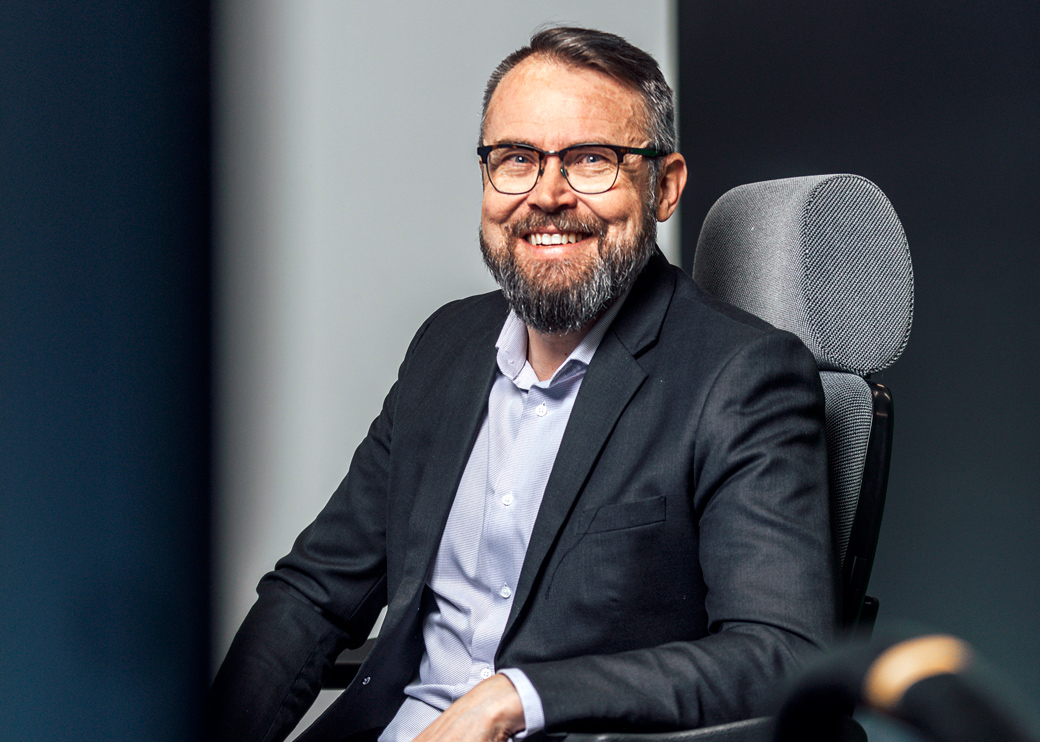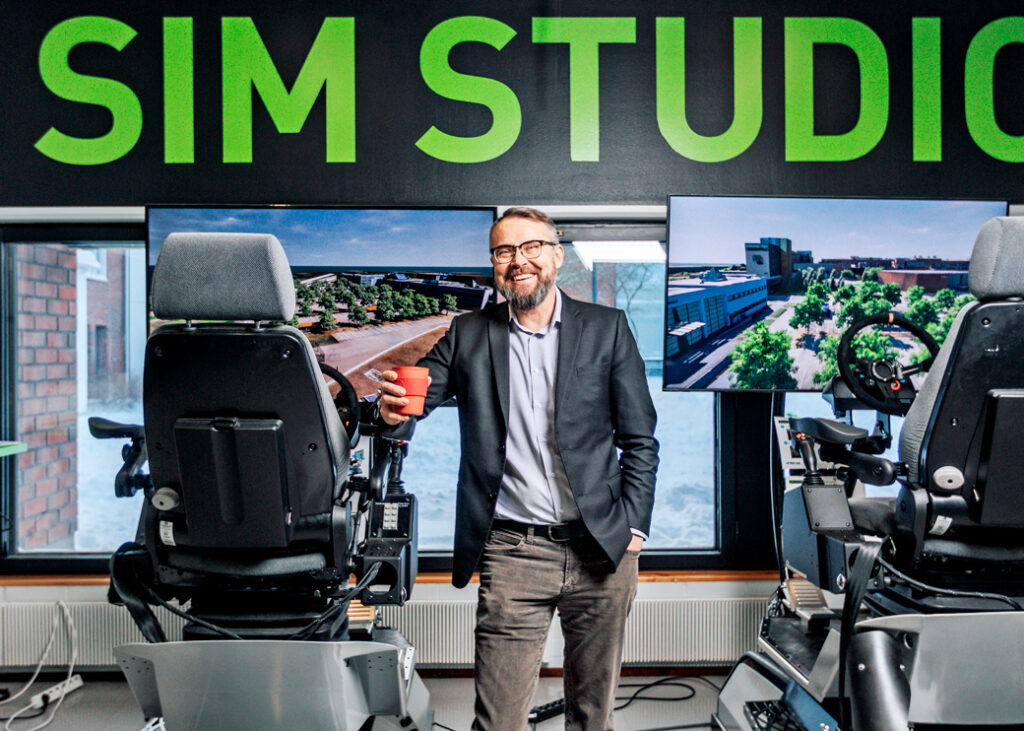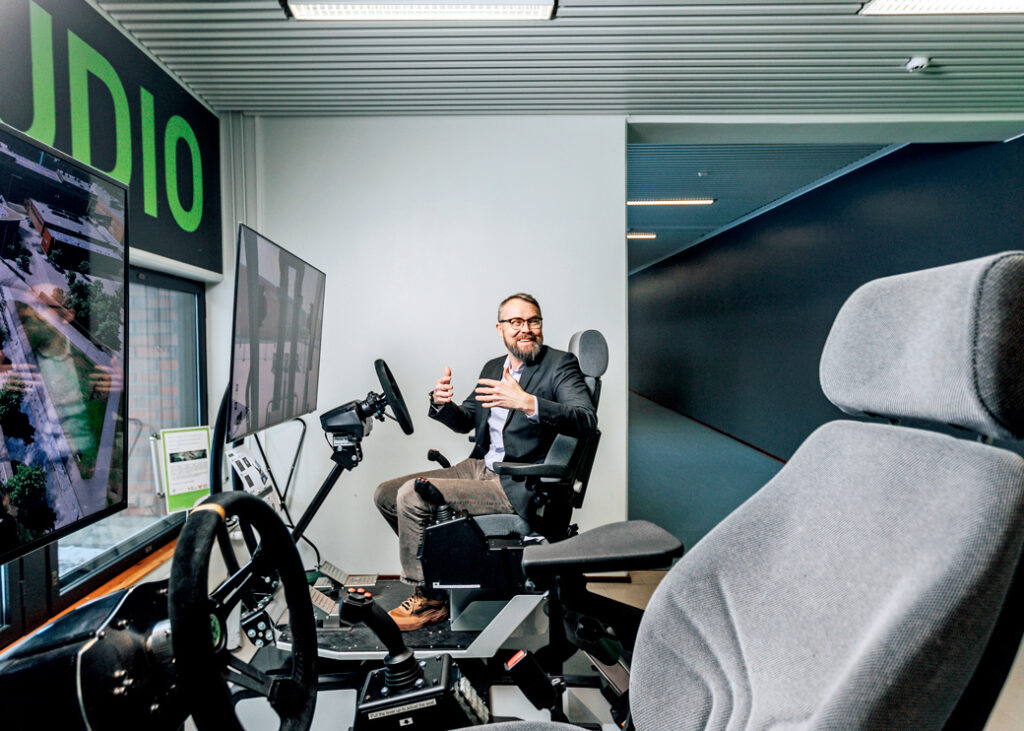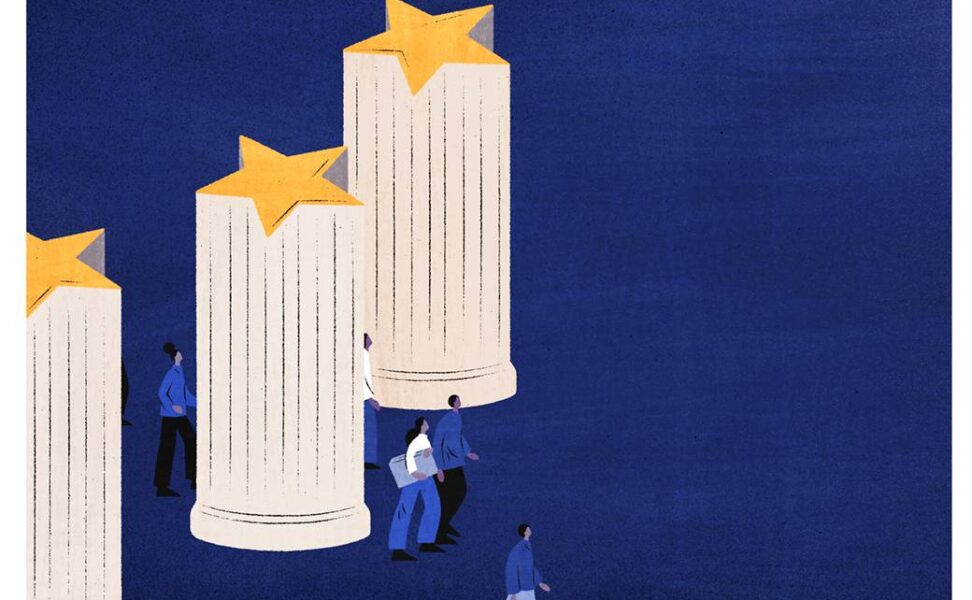
Happenstances and epiphanies
Professor of the Year 2023 Aki Mikkola focuses on discussion, internationality, and the freedom to err. Many machines around Finland bear the imprint of research and instruction.
Text minna takkunen Images teemu leinonen Translation marko saajanaho
When Aki Mikkola first encountered the theory of multibody system dynamics, he could never have guessed it would eventually become his life’s work. At the time, he was a student working on his master’s thesis and studying the hydraulic lifting of a pile of lumber. However, the subject immediately grabbed him.
Mikkola, who has worked as a Professor of Mechanical Engineering in Lappeenranta since 2002, has introduced the theory of multibody system dynamics in machine and equipment design to Finland and successfully applied it when collaborating with countless companies.
Chance has played a role many times along Mikkola’s career, including how international cooperation was established as part of his work as a researcher. On September 11, 2001, he was on a business trip in the United States when that day’s terrorist attacks stopped all flight traffic. Having to share a hotel room with a colleague was initially uncomfortable but eventually lead to useful professional conversations.

“As a Finn, you tend to keep to yourself or gravitate towards other Finns. I figured, why not spend time with my colleagues.”
Wild creative brainstorming born from trust
Internationality is an obvious and natural part of Mikkola’s work. At the time of the interview, Mikkola was on a business trip in Seville, where the LUT University is organising a series of conferences with a Spanish university. This place on the other side of Europe is familiar from a research visit 17 years ago.
Considering others in daily life comes as second nature to Mikkola. Here in Seville, he went on a walk with his colleagues.
“We brainstormed wild ideas and different opportunities. You can do that with virtual design when you can talk without reservations. For that to happen, you need trust, which is born from personal relationships.”
“You must have a deep understanding of things before you can apply your knowledge.”
The international community of multibody system dynamics theory researchers is small, consisting of a few experts. Cooperation is not only useful but basically essential. Alongside accumulating information and developing applications, Mikkola exchanges ideas about matters such as viewpoints related to teaching.
Few of his acquaintances are aware of the fact the professor pondering human factors considered becoming a nursery school teacher in his teens.
“That dream probably stemmed from the fact I enjoyed nursery school myself.”
Macro level understanding, micro level study

Mikkola’s understanding of the field and the importance of a vibrant international scientific community was deepened in the early 2000s when he was conducting research work as a post doc researcher in Chicago. The famous professor in the field, Ahmed Shabana, took the Finn under his wing.
As Mikkola networked with researchers in the field, he internalised committing to one’s research.
“You must have a deep understanding of things before you can apply your knowledge. At times, the level of detail they talked about things in the US was perplexing to me. In Finland, we take a more general approach and tend to talk about higher-level things.”
“You have to keep the students on board and not make teaching too hard.”
The fruitful contradiction helps pace Mikkola’s work.
“On one hand, you must manage the most minute details, and on the other hand, you must be able to explain more broadly what we are doing and why we are doing it. This arrangement helps prioritise.”
Towards inventions through trial and error
After his graduation, Mikkola spent a year working at Valmet. Although his career since then has been built around business applications, Mikkola noticed the university was for him after all.
“In the university world, I improve a little bit each day. That is a source of great satisfaction to me. Combining maths and business suits me well. I enjoy looking for big challenges that might not succeed. Tolerating failure is the way to inventions.”
One error had to do with a calculation method Mikkola had used for a long time and applied when advising Jussi Sopanen on his dissertation. They use the method to calculate the functions of rotary machines. Another researcher in the field happened to come by.
“The new calculational method can be applied to materials with plenty of deformation.”
“He asked if we knew there was a better method.”
This remark gave an entirely new line of research to Sopanen, himself a professor nowadays.
Mikkola does not agree on the perceived conflict between entrepreneurship and research work.
“The old way of thinking is that if you work with businesses, you don’t develop methods. In my work, I solve practical problems, which creates stimuli. In the best case, the situation creates new ideas or even new lines of research.”
His work is hardly a bed of roses. As Mikkola puts it, getting company management on the same page is hard shovel work. As the element of risk increases, so does the workload multiplier.
“One two-and-a-half-year project took three years to prepare. The project studies the productivity of a forestry machinery operator through the automatization of functions.”
Over the years, the external funding obtained by Mikkola, worth 16.1 million in total, has largely gone towards the salaries of Mikkola’s research group.
“We don’t have a large, physical lab. Often, we borrow supplies from others.
Research methods can be tested through teaching
In January, the Finnish Union of University Professors chose Mikkola as Professor of the Year. The decision was based on his peerless and internationally recognised accomplishments in the field of engineering science and the tech industry. He is also a highly esteemed teacher known for emphasising interaction. Mikkola says he looks forward to teaching that lets him trial the research themes he has been pondering. Remote teaching during the pandemic made the importance of in-person learning very clear.
“You can study people’s expressions to see if they grasp the concepts or not.”
He tries to tackle lapses in concentration at long lectures by asking, for example, pronunciations of the Greek alphabet or making simple mistakes in his calculations.
“You have to keep the students on board and not make teaching too hard. I go for the middle pack that covers 80 percent of students.”
Into the soul of a machine virtually, through a game
The results of Mikkola’s research and teaching work is part of countless people’s daily lives basically wherever heavy machinery is operated. For example, forestry and agricultural machinery, paper machines and mining equipment make use of models from the theory he has tested.
The algorithms used to model multibody system dynamics help save time, money, and materials. Physical prototypes do not need to be manufactured to the same extent as before, and any operational deficiencies can be identified early.
One tangible machine is the water-cooled generator used by Mikkola’s team at the LUT University. This helps get more out of the expensive active parts. Efficiency is a valued currency.
“We monitor the machine’s behaviour virtually, much like in the world of games.”
The most revolutionary part of Mikkola’s research is the development of real-time simulators. As the machine operates, it produces data and immediately utilises it. For example, a forestry machine can weigh logs and determine the total mass of the load. The machine can calculate the status of components stressing in use and consequently the need for maintenance.
The applications also extend to medicine, rehabilitation, and sports. The theory can be used to study, for example, bone structure dynamics under pressure. Recently, Mikkola’s team modelled the biomechanical function of the Achilles tendon.
“The new calculational method can be applied to materials with plenty of deformation.”
More and more modifiers can be added to the algorithm, such as the strain rate and twist angle. This is how more accurate physiotherapeutic practices can be designed and real-time alerts can be developed.
The field offers fascinating scenarios for the future.
“Machines will become even more autonomic.”
For example, an application can communicate vehicle maintenance needs via a windscreen-mounted display.
How does Finland treat recent graduates?
The professor describes the LUT University as encouraging and forward-looking.
“People at the LUT University react fast. The university has changed in leaps and bounds. Even a couple of decades ago, the language was Finnish and the attitude very localised. A time traveller wouldn’t even recognise the place.
Mikkola has noticed the same shift happening in industry. More and more companies use English as their working language.
He would like international students laying down roots in Finland to be granted longer permits to live in Finland and a faster way to citizenship.
“How do we treat the graduates? They are the best of the best.”
On the other hand, internationality also means a stressful competitive situation for students.
“A lot of my own work also involves project preparations.”
Time, family, and work form a triangle in the professor’s life, with each part of the triangle pulling him in a different direction. In addition to a breath-taking publishing schedule and advising on dissertations and master’s theses, Mikkola has also excelled in the university’s positions of trust.
From the start of 2023, Mikkola will also serve as Head of the Department of Mechanical Engineering.
“Hopefully, we can make the department even more colourful and international.”
He believes focusing on your strengths to be key.
Aki Mikkola, Professor
Born: 1969 in Heinola, Finland.
Family: Wife and children of 14, 16, and 18.
Job: Professor of Mechanical Engineering at the LUT University
Hobbies: Gym, badminton, skiing, cycling, and camping.
Known in the work community for…?
Liking to ski to work.
Not known for…? A phobia of cockroaches. “If there’s a cockroach in the room, I’m the one hanging from the curtains until we get rid of it.”
.
